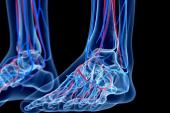AHA Scientific Statement Urges Incorporation of Mental Health Care in PAD
Teams can help patients navigate PAD and chronic stress through openness and learning from each other, says Kim Smolderen.

Mental health services should be integrated into the management of PAD to address the high rate of behavioral needs in this population, a scientific statement from the American Heart Association concludes.
According to the writing committee, mental health issues among patients with PAD have been shown to adversely affect not only limb outcomes, but also overall health status trajectories and the risk for long-term mortality and CV events, making it important to raise the alarm to clinicians.
“In people with critical limb ischemia or early-stage peripheral artery disease, when they experience pain while walking, they have higher rates of depression and higher rates of chronic stress and anxiety as compared with people without that disease in the community,” said Kim G. Smolderen, PhD (Yale University School of Medicine, New Haven, CT), vice chair and lead author of the scientific statement published online October 2, 2023, ahead of print in Circulation.
In one recent study, Smolderen and colleagues looked at hospitalizations accompanied by endovascular or surgical revascularization that were related chronic limb-threatening ischemia and saw that depression/anxiety diagnoses have been on the rise in this population over the last decade. These data and others form the basis for the scientific statement, which focuses on six areas: comorbid mental health conditions, pain, health behaviors that are impactful for the progression or prevention of PAD (ie, smoking, sedentary behaviors, and sleep), the broader impacts of illness, cognitive dysfunction, and palliative care.
“There are many reasons why we should pay attention to the combination of mental health and vascular disease,” Smolderen noted. “Being mindful of patients who come from under-resourced backgrounds is important. Because of their lived experiences, they might be at higher risk for experiencing stress [and] down the line might have worse outcomes because of the continuous stress that they experience in their bodies. Being aware that these individuals may need more support and more resources to mitigate this risk is something we need to be actively thinking about.”
This is part of the human experience and the human condition. Kim G. Smolderen
For example, the scientific statement includes the case of an Indigenous woman with PAD, comorbidities, and mental health issues in whom years of fragmented, uncoordinated care led to amputation, despair, a stroke, chronic pain, opioid abuse, and suicidal ideation.
To destigmatize mental health issues and “promote evidence-based collaborative, nonhierarchical, and multidisciplinary PAD care,” the writing committee urges the incorporation of behavioral health and a team-based approach to PAD care.
Learning from Each Other’s Fields
To TCTMD, Smolderen said one of the goals of the statement is to highlight the importance of not just viewing patients with PAD as having a disease of their legs, but also seeing the bigger picture and taking “the multidisciplinary PAD care team” beyond a buzzword into routine clinical practice.
“Having a team where people's competencies are respected in a way that it can contribute to the best care that that patient can receive . . . takes a lot of courage and openness and learning from each other’s fields. Those experiences need to be built over time and also need to be taught to new generations of practitioners because it’s a learned experience and not the traditional training that people have gotten so far,” she added.
No single multidisciplinary coordinated care model tailored to the PAD population has been shown to be most effective in optimizing patient outcomes, and the statement says pilot programs are urgently needed.
As for who would need to be on a collaborative team in a behavioral health capacity, Smolderen and colleagues suggest that clinical psychologists, who are Medicare Part B clinicians and have specialized training to deliver evidence-based psychological interventions in medical conditions such as PAD, would be valued additions, as would psychiatrists to handle medication reconciliation or treatment-resistant mental health conditions.
“Case management and linkage to community resources to address socioeconomic distress and needs, as well as longer-term care options, can be served by social work and extending into the community liaison roles served by public health practitioners (eg, community health worker, promotora),” the statement notes. “These behavioral specialties would work alongside the vascular specialties to address PAD-related, multimorbidity, and behavioral health treatment goals.”
Importantly, Smolderen said she encourages vascular specialists to take to heart the main message of the scientific statement, which is that the mental health of patients with PAD cannot be “sectioned off” and left to the responsibility of other providers.
“This is part of the human experience and the human condition,” she said. “Breaking down those stigmas and barriers is as big of a challenge as what PAD patients are experiencing in day-to-day life with their disease.”
L.A. McKeown is a Senior Medical Journalist for TCTMD, the Section Editor of CV Team Forum, and Senior Medical…
Read Full BioSources
Smolderen KG, Samaan Z, Decker C, et al. Association between mental health burden, clinical presentation, and outcomes in individuals with symptomatic peripheral artery disease: a scientific statement from the American Heart Association. Circulation. 2023;Epub ahead of print.
Disclosures
- Smolderen reports no relevant conflicts of interest.





Comments